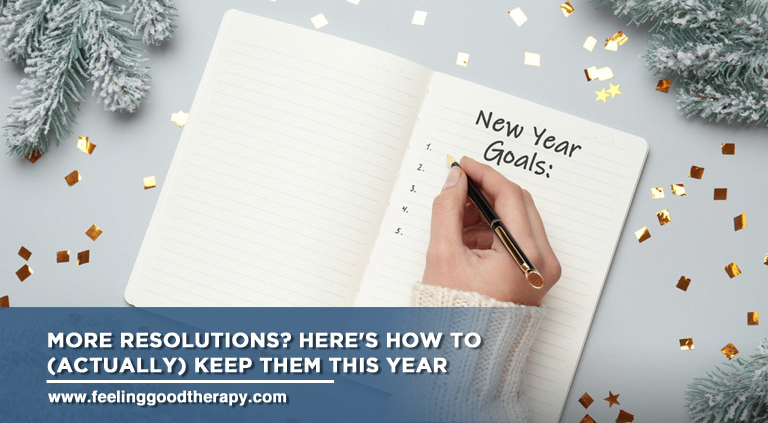More Resolutions? Here’s How to (Actually) Keep Them This Year
For many of us, the new year often means the perfect time to start a new chapter in our lives. That is why people make New Year resolutions to help them change their bad habits and create new and healthier routines that will help them improve psychologically, emotionally, physically, and intellectually.
However, before you create a new year resolution list, you should understand that the New Year is not a catalyst for immediate and drastic behavioral transformation but a time to reflect on your past behaviors and establish positive lifestyle changes. No matter how long and well-thought-out your new year resolutions may be, many people end up abandoning their resolutions immediately and settling back into old patterns.
How Your Behavior Affects Your New Year Resolution
Why do many people find it hard to keep their new year resolutions?
Psychologists say that it typically takes 66 days to develop a habit. According to research, only 40% can successfully follow through with their resolutions after 6 months. While changing a person’s goals and intentions is relatively easy, it is much more difficult to change one’s behavior.
While many people want to change their unhealthy ways, humans are creatures of habit. Between 40% and 95% percent of human behavior is habitual, making them difficult to break.
Another reason why people fail is that they make too many resolutions that are difficult to achieve, making them victims of “false hope syndrome”. This happens when you set unrealistic expectations about changing your behavior. To successfully change your actions, you have to start by changing your way of thinking. Keep in mind that the power of positive mental thinking is key to achieving your new year resolutions in 2022.
Psychological Strategies to Help You Keep Your New Year Goals
Many of us probably do not know that psychological strategies can effectively help achieve a healthier new year. That is why we have rounded several tips on how to create a plan that will help you keep and reach your resolutions:
- Set Realistic Goals
Your new year resolutions should not only be attainable but also practical. For instance, if you tend to drink alcohol every day and plan to minimize your intake, do not stop abruptly. Start by avoiding drinking alcoholic beverages every other day or only drink once every 3 days. You can also break down your long-term goal into more workable short-term goals. Apply this principle if you want to start exercising or eating more healthy foods this year.
- Start Small
Getting rid of your unhealthy habitual behaviors and replacing them with good ones requires time. While the thought of reassessing everything in your life may seem overwhelming, you only need to start small and work on one goal at a time.
If you want to start a fitter and healthier new year, take one step at a time. If your goals include quitting smoking, giving up drinking, getting regular exercise, and eating more nutritious foods, you don’t have to do them all at once. Focus on a single goal and stick to it. Once you achieve it, move to your next target
- Talk About It
Sharing your new year goals with your family and friends can help you keep your resolution since they can act as your support system. For instance, if you want to quit smoking or drinking, they will know not to smoke or drink in front of you. Also, talking about your goals makes you more accountable so it’s more difficult for you to back out.
- Learn to Adapt
It is normal to encounter a setback, but do not let it be the reason to give up on your new year resolutions. If you suddenly find yourself falling back into a bad habit, do not consider it a failure. Understand that the process of changing your habits is often long, and there will be obstacles along the way. Instead of considering relapses as a failure, view them as learning opportunities.
- Reaffirm Your Motivation
You may feel confident and highly motivated to achieve your goals during the first days of your New Year’s resolution. Change may seem easy because you have not yet encountered the discomfort and temptation along the way.
Eventually, your motivation will begin to dwindle when you start to deal with the reality of dragging yourself to the gym early in the morning or the unpleasant effects of nicotine withdrawal.
When you start to feel unmotivated, remind yourself why you want to do this. You can even write a journal to record your small successes. This can help inspire you to keep going when times get rough.
When it comes to achieving new year resolutions, understand that perfection is not attainable. It is normal to falter along the way. If you failed to follow your diet or skipped the gym for three days because you are busy, it’s okay. We have ups and downs. What is important is that you get back on track.
If you are looking for a psychologist who can help you better understand your behavior and guide you in changing unhealthy habits into good ones, ask Dr. Katie Dashtban for help. She will see you through your new year resolution using cognitive behavioral therapy if you’re in Toronto, Los Angeles, or San Francisco. Call 1-888-539-1172 to book a free online consultation.





